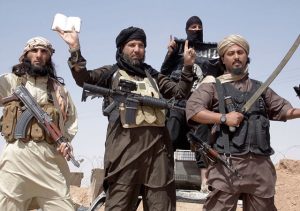There are three main files formed during the tumultuous events of 2017 which will determine how the war against terrorism will proceed in 2018, like reported by alarabiya.net.
ISIS:
2017 was crucial in weakening the ISIS militant group and its strongholds in Iraq and Syria. It turned out to be just an extremist ideology embraced by different groups that belonged to different nationalities.
The first challenge would be to fight, hunt down and neutralize the ISIS who have gone back to their respective home countries to create immigrant cells that would settle in Europe and execute operations under the name of ISIS.
The second challenge would be fighting the militias that have declared allegiance to ISIS in Sinai, Libya and the African desert. Most probably in 2018 these militias will stop linking themselves to ISIS. They might continue their violent operations in their local strongholds but they might be scattered into extremist groups with new names or they might regain their original names like Boko Haram in northern Nigeria or Ansar Bait al-Maqdis in Egypt.
Most likely, 2018 will witness new names for organizations sprouting up where ISIS used to be. The mortal strike on ISIS would happen should Abu Bakr al-Baghdadi be apprehended or by his confirmed death. In that case, his successor in leading the militia would not be able to call himself “caliph” as al-Baghdadi did.
Al-Qaeda:
Since the death of Osama Bin Laden, al-Qaeda turned into a symbolic entity without any real structured organization. It’s supposed leader Ayman al-Zawahri failed to convince the sections of the militia with his position.
During 2017, there was a belief of re-birth of al-Qaeda and predictions that Hamza bin Laden was supposed to be the upcoming leader who would inspire new generations of extremists, and that he would be able to revive the militia.
However, with the exception of some reported clashes that were recorded on extremists’ blogs or audio recordings which would be leaked that alleged a conflict between al-Zawahiri and Hamza bin Laden, 2018 does not seem likely to witness any field or organizational developments that would make al-Qaeda regain its capabilities it had at the beginning of the millennium.
Thus al-Qaeda now is like a dead body. But it could be revived in 2018 on one condition: The Iranian support. The Revolutionary Guard might search for a way to revive the old beast in order to keep the countries of the region busy and forget their conflict with Al-Faqih state. This may pose a great risk for those involved in reviving it. The conspiracy will be obvious and might complicate the situation more for Tehran because of its suspicious relation with the violent hotspots in the region.
Iranian militias
In 2017, armed militias backed by Iran were led to the peak of fighting in Iraq, Syria, Yemen and Lebanon. Iran’s armed support for its militias is unlimited and these militias’ violence became unlimited also. The weakness of these militias is that it depends on the sectarian incitement and battles.
In 2018, these militias will face a decisive stage that will determine its existence. In Yemen, the Houthi militias became completely isolated from all the elements of the Yemeni tribal and political society.
In Iraq, the popular mobilization militias have no obvious enemy after the ISIS collapsed, these militias might attempt to join the mainstream political life through the upcoming elections, but this will make it unable to receive the Iranian support or practice its unlimited violence.
Restoring a regime ruled by the law in Iraq may make the leaders of the popular mobilization face investigations about corruption and the modus operandi of receiving Iranian funds.
As for Syria, where the Iranian militias grew more violently under the cover of al-Assad regime, its fate depends on the Russian will and the complex struggle of power between the active partners in the Syrian file (America, Turkey, Iran). Certainly, this will be reflected on the role of the Lebanese Hezbollah, which intensively interfered in the Syrian arena in a risk that made it face an international confrontation which is bigger than its capabilities.



